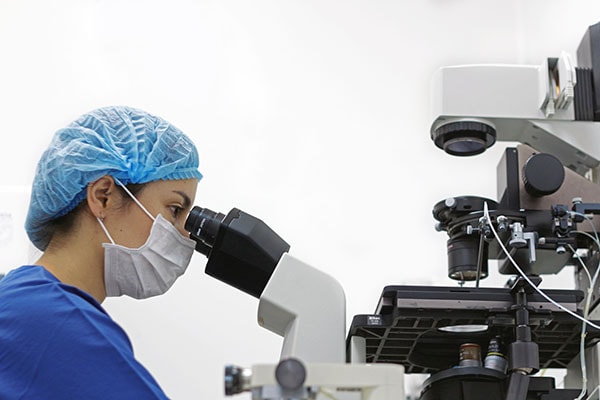Male and female hormonal profiles
When a couple consults a fertility specialist, it is common for the specialist to recommend a simple study to both men and women to know their fertility potential. This study is known as hormonal profile analysis and is done through a blood sample whereby the main hormones that regulate fertility in both members of the couple are analyzed.
In women, we study hormones that are directly related to the functioning of the ovaries, and in men, hormones that are related to the production of sperm.

What is analyzed in the female hormonal profile?
According to their age and other variables such as obesity and diseases in the endocrine system, many women may have hormonal imbalances that may impact their fertility and overall health. To detect these abnormalities, your doctor may order a profile to evaluate the functioning of hormones and thus recommend the appropriate treatment to improve or regulate your production.
The hormones studied in a hormonal profile are:
- Follicle-stimulating hormone (FSH): A hormone in the gonadotrophin group that acts on the ovary, favoring the development and maturation of ovarian follicles.
- Luteinizing hormone (LH) is another gonadotropin in the final step of follicular growth, ovulation, and progesterone production in the corpus luteum.
- Thyroid-stimulating hormone (TSH): A hormone released in the pituitary that regulates the production of thyroid hormone in the thyroid gland.
- Prolactin: This hormone is crucial during pregnancy. It stimulates milk production in the mammary glands and progesterone synthesis in the corpus luteum. Elevated levels in a non-lactating woman give the diagnosis of hyperprolactinemia, which is a cause of infertility and requires treatment to achieve pregnancy.
- Estradiol (E2): A hormone produced by the ovaries in the ovulatory follicle in response to Gonadotrophins (FSH), which, among other functions, allows the body to complete secondary sexual development and female sexual characteristics, stimulates maturation of the ovum inside the follicle and activates the release of LH, thus inducing ovulation. In addition, progesterone intervenes in preparing the endometrium for embryonic implantation.
- Progesterone (P4) is a hormone released mainly by the corpus luteum and the placenta (in case of pregnancy). It acts during the second phase of the menstrual cycle, preparing the endometrium for embryonic implantation. It is also in charge of maintaining pregnancy. If the pregnancy does not occur and its level decreases, it causes the expulsion of the endometrium, also known as menstruation.
- Antimullerian hormone (AMH): This hormone is secreted by the immature follicles of the ovary. It is used as an indicator of ovarian reserve. It does not depend on mature eggs or gonadotrophins, which means it is not dependent on the menstrual cycle, and because of this, it can be taken at any time.
- Free Triiodothyronine (T3): A hormone produced in the thyroid gland in response to the stimulation performed by TSH. It helps to evaluate thyroid function.
- Free thyroxine (T4): Another hormone produced in the thyroid gland in response to TSH. Low free T4 and T3 values may indicate decreased thyroid hormone production, essential for metabolism, including ovulation and pregnancy.
- Total testosterone (T): The male hormone par excellence. However, women produce low levels of testosterone that should later become estrogen. It may be elevated in diseases such as congenital adrenal hyperplasia or polycystic ovaries.
- Inhibin B: A hormone produced by the ovary that allows the selection of a single follicle for ovulation. Its levels have been associated with the study of ovarian reserve; however, its results have not been those expected as far as the prediction of ovarian reserve, and its use has decreased in recent years.
What are the normal levels for these hormones
Male Hormonal profile
Male sex hormones play a crucial role in reproduction, as they are widely involved in sperm production (spermatogenesis). The most important hormones in this function are prolactin, testosterone, dihydrotestosterone, LH, and FSH.
What hormones are analyzed in the male hormonal profile?
- FSH and LH: FSH and LH have related functions since both acts at a testicular level in men. On the one hand, FSH regulates spermatogenesis in the seminiferous tubules of the testicle. It acts on the Sertoli cells, which protect and nourish the sperm precursor cells (spermatogonia). FSH also promotes the production of androgen-binding proteins (ABP), and LH stimulates testicular testosterone secretion by acting in the Leydig cells. Additionally, by the action of the ABP, testosterone can be affixed to the testicle to function during spermatogenesis.
- Testosterone and Dihydrotestosterone: Testosterone is the male hormone. It is synthesized mainly in the testicles by the action of LH. It is also found in the adrenal glands, both in men and women. In the ovaries, this is found only in small quantities. It is essential for the proper production of sperm, so low levels are related to damage to these qualities. The 5α-dihydrotestosterone (5α-DHT) is a derivative of testosterone, which means it is synthesized from testosterone thanks to the action of the 5α-reductase enzyme.
- Prolactin: Like FSH and LH, prolactin is a hormone segregated by the pituitary gland and involved in the male reproductive function. It is necessary for the proper functioning of the male reproductive system and acts mainly on the Leydig cells and testosterone synthesis.
What are the typical values of male hormones?
| Hormone | Minimum level | Maximun Level |
free testosterone | 90 pg/mg | 300 pg/mg |
Total testosterone | 270 ng/dl | 1070 ng/dl |
| 5a-DHT | 30 ng/dl | 85 ng/dl |
| FSH | 1 mUI/ml | 12 mUI/ml |
| LH | 2 mUI/ml | 12 mUI/ml |
Prolactin | 2,5 ng/ml | 17 ng/ml |
We invite you to follow the doctor’s recommendations before practicing these hormonal tests. The results of these analyses depend on good preparation.
Contact us in our lines:
- Medellín: +57(4) 268 80 00
- Bogotá: +57(1) 746 98 69
- Cartagena: +57(5) 693 04 34
- Pereira: +57(6) 340 17 09
- Whatsapp: +57 316 3033866




